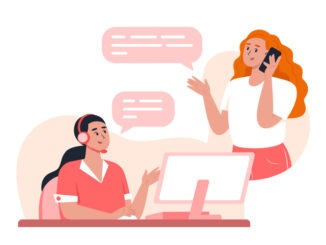
For leaders, the ability to create psychologically safe workplaces is critical for strong performance – Amy Gallo helps leaders navigate the tricky conversations
CREDIT: This is an edited version of an article that originally appeared on Management Today
In Gallup’s annual research into workplace culture there is a consistent link between the benefits of having friends at work and strong engagement and performance. For example, in its latest survey, 30% of people said they had a ‘best friend’ at work, and those people were seven times more likely to be engaged in their jobs, better at customer service, producing higher quality work and less likely to get injured.
Amy Gallo identifies eight archetypes of difficult people in her new book, Getting Along – How To Work With Anyone (Even Difficult People), and provides practical advice on how to deal with them. They are: the insecure boss, the pessimist, the victim, the passive-aggressive peer, the know-it-all, the tormentor, the biased co-worker and the political operator.
A possible rise in conflict since the pandemic
Gallo has noticed a societal shift in attitude towards conflict since the pandemic. “I put a call out about the book at the very beginning of the pandemic and used the phrase “difficult people” and got pushback saying it was unfair to call people ‘difficult’. When I was getting ready to launch the book last year, I put a similar call out, and people said. ‘Why even give advice? Just report them to HR – cut them out and be done with them!’ I thought, ‘Gosh, what’s happened to society?’”
This response suggests a shift to a more individualistic society, where people are not as willing to give others the benefit of the doubt. “There’s less tolerance in general of bad behaviour, which is a good thing in many ways, but it concerns me when we dismiss people out of hand before actually giving them a chance. It’s understandable after what we’ve been through during the past three years, but I hope the pendulum is going to swing back to more collective concern,” she says.
Conflict can be beneficial
There will always be conflict between people. “There is no such thing as a conflict-free team – it’s an inevitable part of interacting with other humans. We’re all hardwired for likeability, but, more often than not, what we really want is to be respected and trusted. People respect people who can handle conflict, who can be direct, who can be honest, who can facilitate a difficult conversation.
“Conflict can also be beneficial to a business if done in the right way – many pride themselves on being able to have healthy disagreements because it creates better, more creative, ideas.” Gallo believes that we don’t have enough healthy conflict in most workplaces, by which she means space for people to debate and disagree about a strategy or an idea, rather than criticising people personally.
She also urges leaders not to be afraid of conflict. “I’ve worked with leadership teams where the CEO is the most conflict-averse person in the room, and that person loses a lot of respect from their team. They are not able to get people through a difficult conversation or decision to productive action. Navigating normal tensions in discussions is a critical leadership skill; you can’t be an excellent leader without that.”
To create an environment where positive disagreements can occur, Gallo advises leaders to normalise conflict;make it clear that it’s acceptable to have differences of opinion but explain that they must keep focused on the ideas, not the personalities behind them.
What most people get wrong about conflict is that they see it as a combative, winner-takes-all fight, rather than a chance to collaboratively form a solution. “When you think about conflict, many visualise two people on opposite sides of the table trying to hash it out – but if, instead, you see that of as a tug of war between two people, I don’t think you have a lot of room to build a constructive, productive resolution.”
“I like to think of two people sitting shoulder to shoulder on the same side, with a third entity, which is the problem that they’re trying to solve, on the table. That visual makes much more sense. It’s a more collaborative way to get through conflict,” she says.
Put yourself first
If you are facing a difficult person, Gallo is clear; you must put yourself first. One tactic, she says, is to set clear mental and physical boundaries. “You need to find a way to right-size the stress – that’s my core piece of advice. Make sure you are allowing the person to take up the appropriate amount of your time and effort, so they are not controlling your psyche and ruining every day. Realise that just because someone gets defensive or upset or is being rude or uncivil to you, that doesn’t mean anything is wrong with you.”
If all else fails, Gallo believes repeating this mantra can also be very helpful to internalise and repeat.
“Sometimes people are going to be mad at you, and that’s ok.”


Be the first to comment